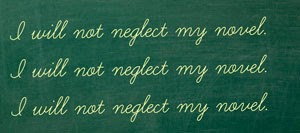Why I Am Taking Two Terms Off
I have been playing this game my whole life.
1988. I should be blowing on the sparks of my freelance career; instead, I am on a stepladder, painting the eaves of a schoolhouse red. That year, I write brochures, catalogues, copy for the backs of other people’s books. But my heart is in the schoolhouse, where we read Romeo and Juliet and paint canvas teepees with the juice of berries we stole from the woods.
 |
| Ponce de Leon Hall, Flagler College |
Here’s the question I’ve been trying to answer recently: Am I a teacher who writes, or a writer who teaches?
It’s not a semantic distinction. At Flagler, I have written more than four hundred pages of lecture material and dozens of critique letters. But very few stories. I know that the first few years of teaching, when you’re creating courses out of thin air, there’s not a lot of creative energy left for story-drafting. Still, most Hamline professors and lots of graduates somehow balance the demands of the classroom with the demands of the book.
Maybe it gets easier once you master the courses.
Maybe I made a mistake. Maybe, feeling a little lost after graduation and facing a small flurry of rejections, I turned to the safest, warmest place I know.
Not that teaching is anxiety-free. Every single term, I stand in front of a new group of students, awash in strangely adolescent anxiety. What if they hate me? What if the soccer players in the corner laze audaciously like that all term? What if that girl is twisting her hair because she’s bored? Then, about week four, something happens. The students write an essay in which they tell me about the event that changed their lives forever, or if it is a fiction class, they submit their first manuscripts. I read them. I write back. And that is when love shambles in, barefoot and late, as usual. Ten essays and two workshops later, I don’t know how to let them go.
Once, I opened a note from a student I knew had been beaten and berated every day of her childlife. She had written, “I think I am Matilda, and you are my Miss Honey.” That kind of letter is lifeblood (though if I’m in a bleak mood I might call it a crack pipe). I start asking questions like, “Do I spend my time writing on the off chance something gets published, or do I help this person standing in front of me right now?”
And it’s not just the love that has me hooked. In the classroom, I’ll try anything. When I taught Skellig, I thought, What if, instead of talking about the book, we responded with a sculpture instead? I lugged a thirty-pound slab of clay into the room, made a whole bunch of mistakes about how best to cut and distribute it, and let everyone play. They sculpted owl-embellished branches, babies enfolded in petal cradles, and many other lumpy, indistinct things—and if ever a story celebrated the lumpy and indistinct, it is Skellig. What keeps me from turning myself loose like that on the page? Why don’t I relish the grand foolish writing mistake?
I don’t know. Here’s what I know: This year I turn fifty. I am deep in the game. All the time, I’m thinking about the teachers without whom I’d never have dreamed of writing, and the writers whose books saved me when I was in school. Heaven help me, I don’t know which one is more important, and I sure don’t know which one I’m better at. Two roads do diverge in the yellow wood, and all I know to do is wander back and forth between them, making my wrenching soliloquys.
***
Becky Stanborough is a January 2010 graduate of the MFAC program. She teaches and writes in Florida.



No comments:
Post a Comment